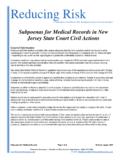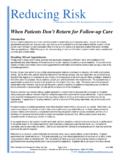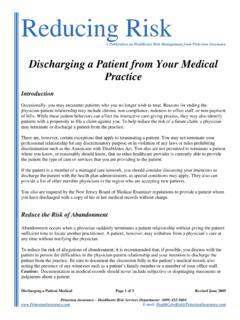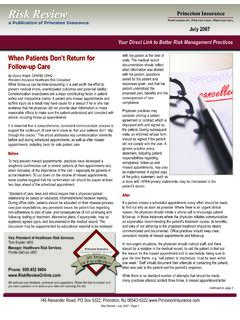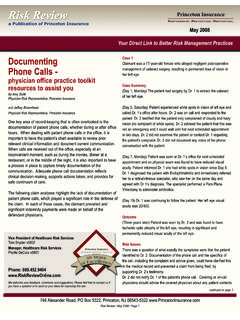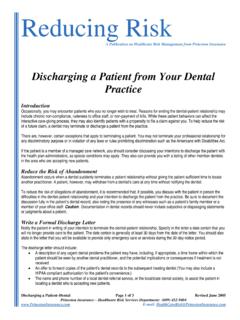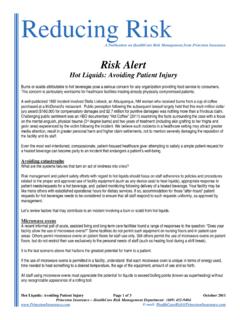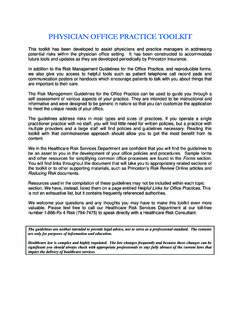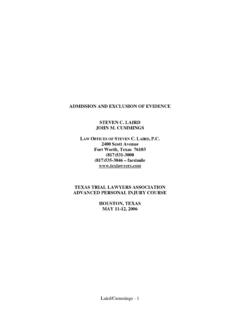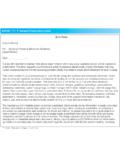Transcription of Medical Records: becomes very difficult Best Friend or ...
1 Medical Records: Best Friend or Worst Enemy?By John O FarrellVice President, ClaimsPhysicians are legally obligated to maintain adequate and accurate patientmedical records, whether they practice in a hospital or ambulatory permanent legal document, the Medical record often serves as a criticallyimportant means of communication among healthcare providers concerninga patient s Medical history and course of treatment. The Medical record alsoprovides information that supports the need for a particular diagnostic testor type of treatment in the event of a reimbursement or utilization dispute. From a risk management perspective, the Medical record is a crucial factorin preventing and minimizing potentially adverse Medical consequences.
2 Itis also a key element in defending malpractice claims and lawsuits since itdocuments the patient s history with which the physician began, thephysician s critical thinking in evaluating the current situation, the basis forthe diagnosis and treatment the physician offered and prescribed, thesequence in which care was provided, the patient s response to treatment,and any reluctance or failure by the patient to heed the physician s contrast, a poorly maintained or improperly modified or altered record willbe used to attack and undermine not only the physician s diagnosticacumen and the appropriateness of the care that was provided, but also thephysician s credibility regarding what was discussed with the patient,including the patient s reluctance or refusal to heed the physician s such, the Medical record has sometimes been referred to as the witnesswhose memory is never lost.
3 Common Pitfalls in Malpractice LitigationUnclear, incomplete, or inaccurate record entries It is critical to document contemporaneously the care offered, provided, orrejected as completely as possible, including the date, time and signature ofthe healthcare provider who is making the entry. Without dates and times, itbecomes very difficultto establish timelinesof care, either forreference by otherhealthcare providersor for use inmalpractice litigation. Beyond that, theabsence of timely andaccuratedocumentationprovides the obviouslydissatisfied plaintiffwith the means tochallenge the qualityof care the physicianprovided during theirrelationship, includingdisputing the historythat was given,potential diagnosesthat were discussed,tests that were eitherordered or suggested,referrals that were recommended or declined, etc.
4 Leaving thedocumentation door open enables the unhappy plaintiff with a selectivememory to retrospectively create issues and scenarios that never existedbut which a creative lawyer and his willing expert can use to suggest thatthe physician did not, in fact, provide the care required under the short, untimely, poorly maintained, incomplete, illegible or improperlyaltered Medical records can be, and often are, used to suggest not only thatthe physician provided inadequate Medical care, but also that he/shesubsequently attempted to doctor the treatment record to conceal that , a timely, contemporaneously created and well-documentedrecord can serve as the physician s first line of defense in such claims.
5 SpoliationThe term spoliation generally refers to the destruction or concealment ofevidence. In the context of a malpractice case, the concept can be a potentweapon used not only to compromise the defense of the Medical case, butalso to inflame the jury s passions against the defendant law requires physicians to ensure that Medical treatment recordsaccurately reflect the treatment or services provided. The law furtherspecifies that corrections or changes to entries in such records may bemade only where the change is clearly identified as such and thensimultaneously dated and initialed by the person making the change.
6 Summer 2010746 Alexander Road, POBox 5322, Princeton, NJ08543-5322 Review Summer 2010 Page 1 Vice President of Healthcare RiskServicesTom Snyder x5852 Manager, Healthcare RiskServicesPhyllis DeCola x5897 Phone: welcome your feedback, comments and suggestions. Please feel free to contact us ifyou have a question or to send us your ideas for improving this on page 2It is illegal for a person to alter Medical records with the intent to deceive ormislead anyone. The liability resulting from such an act may be civil, or insome cases, criminal. In a civil malpractice action, for example, the courtmay instruct the jury that if they conclude that the alteration was intentionallydone to deceive or mislead anyone, they may infer that the physician alteredthe record because he/she believed the original would have beenunfavorable to him/her in the trial of the case.
7 Evidence of such alterationmay also serve as the basis for the plaintiff asserting a separate andindependent claim for fraudulent concealment against the physician seekingto recover both compensatory and punitive may take the form of destroying the original record , of rewritingthe original record , or creating a new and different record . It may also consistof erasing, obliterating or adding information to the original record after theoriginal note was made. Although there may be times when a non-contemporaneous entry in a Medical record is appropriate, the physicianmaking such an entry should be certain to follow the rules whenever makingsuch an addition or Impact Extends Beyond Patient Care and Litigation ConcernsThe failure to maintain adequate and accurate records may not onlyjeopardize the welfare of the patient, but also constitutes unlawful andunprofessional conduct.
8 In addition, it may affect the availability of insurancefor a malpractice claim in which improper record keeping is involved. Insurance companies may deny coverage if the insured fraudulentlydestroys, rewrites, creates, alters or modifies a Medical record . In New Jersey, the purposeful destruction, alteration or falsification ofrecords relating to the care of Medical , surgical or podiatric patients inorder to deceive or mislead is a crime of the fourth degree( ). The NJ Board of Medical Examiners considers unlawful alteration to bean act of professional misconduct, and can therefore levy sanctions andfines against offending license holders.
9 Spoliation Detection Experts such as forensic chemists, ink-dating, fingerprint and DNAspecialists employ a number of techniques to detect record alterations. Forexample, the ink-dating technique can detect an alteration made with adifferent pen, as well as determine the age of the document or a particularink. The ink specialist may also utilize an infrared image converter or speciallasers to confirm that ink of the same color was used at different , such expert testimony confirming that an alteration has occurredwill be used to undermine the credibility of the healthcare provider involvedin the spoliation.
10 It may also serve to inflame the jury s view of what justicerequires to set things right, thereby increasing the amount of compensatorydamages that the jury may award to the aggrieved patient, as well as fuelinga separate and additional punitive damages award. Correcting a RecordObviously, the most troubling record change cases are those in whichrecords have been intentionally altered to cover up diagnostic, treatment orcharting deficiencies or errors. However, even legitimate, well-intendedmodifications to records can give rise to suspicion of improper intent if notcorrectly what should one do if he/she discovers a mistake or omission?
